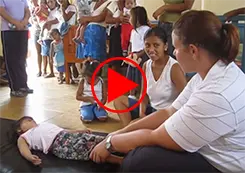The Importance of Integrating Primitive Reflexes

Primitive (infant) Reflexes are repetitive, automatic movements that are essential for development of head control, muscle tone, sensory integration and development. They form the basis of our postural, lifelong reflexes. These primitive reflexes surface in utero and infancy and become inhibited as the movements do their job and movements become more practiced and controlled. When a baby has been given the opportunity to develop freely and naturally the primitive reflexes will integrate and no longer be active. When the primitive reflexes remain active then many difficulties can emerge.
Incomplete integration of primitive reflexes may be a contributing cause of ADD/ ADHD, autism, learning challenges, developmental delay, sensory integration disorders, vision and hearing challenges, behaviour challenges, and extreme shyness, lack of confidence, addiction, inefficient, effortful striving, and constant feelings of overwhelm. Rhythmic Movements help children and adults complete the primitive reflex patterns and transform the challenges into integration.
From very early on in utero, the primitive reflex movements literally help develop the brain. The movements lay down the patterns of neural networks and myelinisation of pathways that allow the connection of the various areas of the brain that are so important later on for learning, behaviour, communication, relationships and emotional well being.
Integration of the primitive reflexes important because:
- They are the basic of our nervous system and our ability to move
- They originate in the brain stem. This area of the brain is responsible for survival. If under stress we are still moving from here then we are not able to easily access our prefrontal cortex where we can process and analyse information. Instead we stay in survival and stress.
- As we get older our unintegrated reflexes trigger the flight/flight response even when there is no ‘logical’ reason for the stress. So stressed behaviour becomes are pattern of responding.
- When our movements come from active primitive reflex movement patterns then there are challenges with coordination. This can lead to reading and writing difficulties; language and speech delays; disorganisation; fidgeting; concentration etc. Other challenges may be seen in poor bladder control; breathing difficulties; skin problems; and having a uncontrollable sweet tooth
- Low muscle tone; muscle weakness; chronic body aches; poor endurance; and fatigue.



